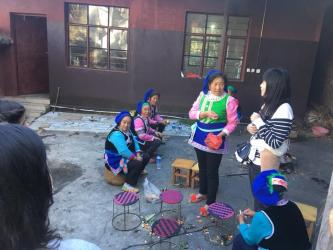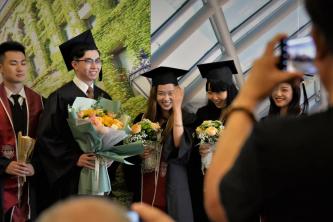UChicago collaboration with China advances the social work profession
Advancing Social Work in China
For the past two years, the UChicago Crown Family School of Social Work, Policy, and Practice has been part of a groundbreaking partnership with Peking University (PKU) and Hong Kong Polytechnic University (PolyU) – formally called the Tripartite Collaboration for Advancing Social Work in China. Working together, the three universities have been leading an ambitious initiative to develop social work education and research in China.
The initiative is a response to the Chinese government’s daunting goal to train two million new social workers by the year 2020 – a workforce that will help address the challenges created by the country’s rapid urbanization. By 2050, Chinese cities, according to a United Nations report, are expected to add 292 million people. With such urban growth comes a new range of urban problems, including health care disparities, child welfare concerns, and access to family support services. In a country like China where urbanization is driving extensive migration from rural communities to urban centers, there also are significant repercussions in the rural areas where migrants originate.
“To mitigate social problems caused by urbanization, you need to understand how urbanization affects vulnerable populations in both rural and urban areas,” said Crown Family School Deputy Dean for Strategic Initiatives and McCormick Foundation Professor Robert Chaskin, who holds a UNESCO Chair on Inclusive Urbanism and plays a key role in the Collaboration. “It includes understanding the push/pull factors that drive migration, the nature of connections maintained or lost between migrants and their rural communities, and the challenges faced by those ‘left behind’ in rural communities and those trying to make their way in new urban areas.”
Understanding Urban-Rural Dynamics in China: the Enduring Foundations project
Children, especially, have been hard hit by the migration of rural workers to urban areas. Today, China has more than 60 million children who are left behind as their parents move to work in cities hundreds of miles away. To assess and develop practical responses to the challenges created by urbanization – especially for children and the elderly – the Collaboration launched the Enduring Foundations project. This community-based project promotes the positive development and mental health of rural children and adolescents.
“We are using an ecological developmental model that examines children’s relations and resources at several levels, including the family, the school, the community, and the broader society,” said Chaskin. “The project has dual objectives: to understand and address the needs of migrant populations and their families at each end of the spectrum. And to understand and draw lessons about the links between rural and urban contexts and migrant populations.”
On-the-ground efforts in Dianji (rural community)
In the small rural village of Dianji (population: 3,457), researchers have been developing a community-based project with individual, family, and community interventions that will create cohesive, long-term solutions and supports for left-behind children and their caregivers. Building on background research about village history and family structure, the reseach team will be adding information about behavioral and mental health needs. The team also has been building and reinforcing relationships with local organizations, government officials, and community leaders. Having such local support will be invaluable in advancing the Enduring Foundations’ interventions and village outreach programs.
On-the-ground efforts in Nanjing (urban community)
In Nanjing, a city of more than eight million, the Collaboration is building foundational information about policies that relate to the needs of migrant workers and families, the distribution of migrant workers, the sectors in which they work, the challenges migrants face, the current resources, services, and programs currently in place to address their needs, and the gap between migrant needs and challenges and the services available to address those challenges. The challenges include meeting the educational needs of migrant children, supporting elderly migrants who care for young children in the city, the health and safety of migrant workers on the job, finding adequate housing, and integrating workers into the urban community.
To help build a network of organizations that can respond to these challenges, the Collaboration team held a symposium and workshop at Nanjing Normal University to further refine the Enduring Foundations scope and define next steps. The event gathered social workers, policymakers, community leaders, and service organizations that serve the growing migrant population in Nanjing and other parts of China. Participants met in working groups to discuss key challenges and identified key issues to inform critical research, practice, and policy directions that will inform the project going forward.
Expected Outcomes
Throughout the Enduring Foundations project, the team expects to generate new models of practice and an evidence base that will inform policy and implementation in other communities across China.
“In the rural community, we hope to develop interventions that will enhance school performance for children, enhance the health and social development of children, and increase the capacity of local organizations so they can better support children and families,” said Chaskin. “In the urban community, our goal is to create a model for strengthening the ability of service providers – including local governments, NGOs, and other stakeholders – to strategically engage with migrant populations – providing services, and helping them integrate into the social fabric of the communities in which they work.”
Other links:
http://ssa.uchicago.edu/ssa_magazine/bridge-china
http://ssa.uchicago.edu/ssa_magazine/visit-china-expands-knowledge-social-work-and-urbanism



